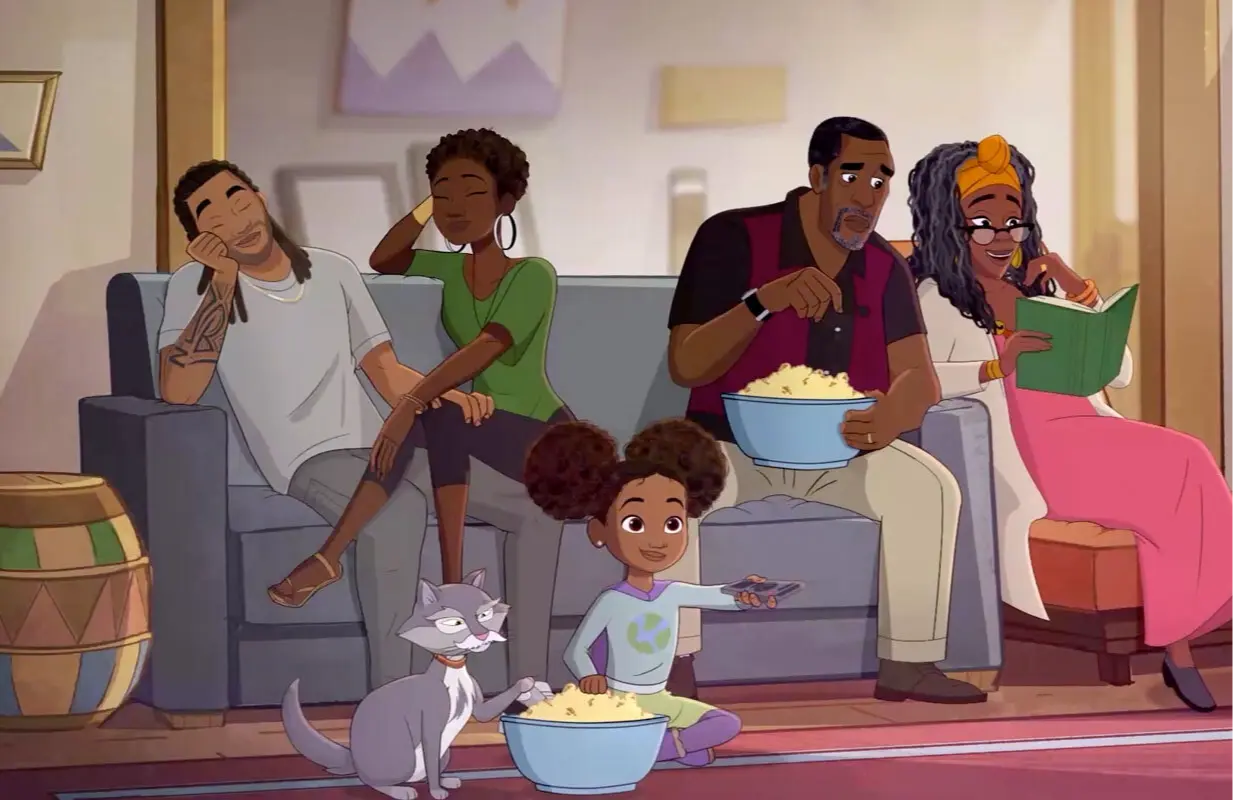Young Love Goes Beyond Its Kid-Friendly Roots to Explore Contemporary Black Family Life
-
 Young Love (Image: Max)
Young Love (Image: Max)Before it was an Oscar-winning short film or even a New York Times bestselling children’s book, filmmaker Matthew Cherry’s Hair Love was a seed of an idea nourished by a viral phenomenon. After years of ruminating on a story about a dad taking on the challenge of styling his daughter’s hair for the first time, Cherry noticed a growing trend of clips showing Black dads interacting with their children. The videos made their rounds across the internet, and Cherry identified a widespread hunger for both positive images of Black fatherhood and hearty celebrations of natural hair. Inspired, Cherry launched a Kickstarter that earned over $280,000 and a wide community of industry supporters.
Whereas the initial public interest highlighted a longstanding dearth of relatable content featuring Black families, Hair Love delivered an imaginative spin on a milestone experienced by many fathers and their daughters. Through young Zuri and her parents, aspiring music producer Stephen and natural hair vlogger Angela (voiced by Issa Rae), viewers witnessed how a seemingly small act of proper grooming translated into an intimate expression of love at a time when a family needed it most.
Creator and EP Cherry revisits the charismatic trio — this time for Max — in a new animated series that expands their universe and digs deeper into family and community dynamics. Young Love follows the Young-Love family as they navigate life in their Chicago neighborhood. From its inception, Young Love faced a specific challenge that many diverse shows in its position have grappled with and, in a few cases, fumbled: telling a story that felt equal parts necessary and real without feeling heavy-handed or preachy. But balanced story arcs that are seemingly rooted in shared, complex experiences provide glimpses that illuminate rather than pander.
Part of Young Love’s charm lies in its casting. Rae returns as Angela Young, who has freshly entered remission after a bout with cancer, and is joined by a roster of cultural paragons, including Scott Mescudi (Kid Cudi) as Stephen Love; Loretta Devine and Harry Lennix as Angela’s parents-slash-landlords, Gigi and Russell; Tamar Braxton as Stephen’s producing partner, Star; and Sheryl Lee Ralph as Angela’s hair salon colleague, Gina. Newcomer Brooke Conaway shines as precocious Zuri, a six-year-old destined for great things thanks to her wit, sharp tongue, and entrepreneurial spirit.
Though the playful animation and grounded themes still hint towards its family-friendly roots, Young Love neatly shifts this universe into a more adult direction with a tone that marks a natural evolution rather than a pivot. But to lump it in with raunchier adult animation predecessors would be a misstep; Cherry manages to find a sweet spot between wholesome and mature, a delicate balance that has worked for shows like Bob’s Burgers and King of the Hill. Rather than focusing solely on Zuri, the series also examines Stephen and Angela as they also navigate growing pains in their personal and professional lives.
Of the show’s various narrative threads, Angela’s journey as a millennial mother post remission is perhaps the most compelling. As she works to re-enter society after a lengthy convalescence, Angela aims to escape the infantilizing treatment dealt by her support system and figure out what her next stage in life looks like, whether that means returning to her salon chair as a stylist or becoming an influencer-slash-life-coach. She and Stephen also explore what parenting and leadership mean in the modern era as they work to break toxic generational cycles of behavior that many millennials of color experienced during childhood.
But doing so can be an incredibly complicated process, and Young Love does an excellent job of hitting those nuances. The episode “Generational Love,” which follows Angela’s struggle to draw strong authoritative boundaries amid her desire to be her child’s best friend, is the season’s best example of this, weighing the different parenting ideologies (“I’m not one of your lil’ friends” vs. the more attached “I want to be your bestie”) without really declaring a right or wrong approach.
Young Love’s inaugural season approaches most of its characters and topics like faith, commitment, gender roles, gentrification, advocacy, and financial hardship with such great care that its few, minor flaws can feel pronounced. Russell Young, for instance, largely exists as a vocal reminder of Stephen’s perceived shortcomings as a provider, often repeating stale jabs about late rent and the young couple’s tight finances like a broken record. It's difficult to see what he adds to this lively ecosystem, where every other character around him shows signs of growth; his companion Gigi is the one who provides the valuable perspective of an older, experienced generation. But the occasional, dusty landlord humor is a small speed bump on a largely enjoyable ride with a family that is actively growing and learning together — all for the benefit of a little girl with an extra-special crown of hair.
Young Love premieres September 21 at 3:01 AM ET with four episodes on Max. Join the discussion about the show in our forums.
Shannon Miller is a cultural critic, editor, and podcaster who focuses on the societal impact of TV, film, music and advertising.
TOPICS: Young Love, Brooke Conaway, Harry Lennix, Issa Rae, Kid Cudi, Loretta Devine, Matthew A. Cherry, Sheryl Lee Ralph, Tamar Braxton